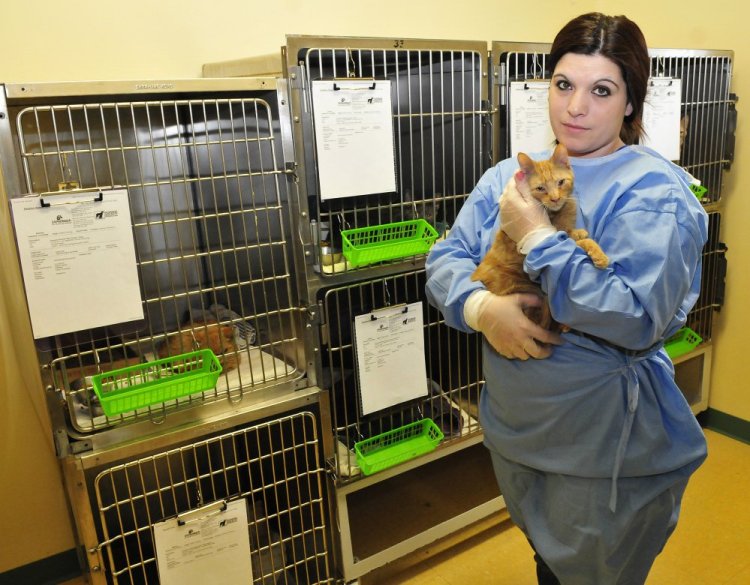WATERVILLE — Forty-one cats, many with upper respiratory illness and four that are pregnant, are being cared for at the Humane Society Waterville Area after being rescued Wednesday from a home north of the city, a shelter official said Thursday morning.
The felines, most of which need to be neutered and spayed, had been living with an older person in what Humane Society volunteer coordinator Karen Hilton described as a hoarding situation.
“As usual, they think they’re doing what’s best and they’re not,” Hilton said. “I don’t want to say they were not cared for, because I think they were fed. Some had decent weights but some did not.”
Animal Control Officer Chris Martinez brought the cats to the shelter Wednesday from a town Hilton declined to name because she did not want the owner to be identified. She said a social worker notified the Humane Society about the animal situation.
The cats are being kept in three rooms at the Webb Road shelter, separate from other animals. Some felines are just a few days old, while others are as old as eight.
At the shelter Thursday, the cats and kittens languished in cages, looking feeble. There were orange tabbies, calico, tortoise shell, black, gray and Russian blue cats. The kittens were meowing.
Shelter intake manager Stacey Recanati said she and the shelter’s dog technician, Ricky Tucker, helped Martinez remove the cats from the home Wednesday and bring them to Waterville.
“They were really scared, which is typical when you have 41 cats in a confined area, because there’s no way to get them all socialized,” Recanati said. “They’re not getting the attention they need. There are too many hiding places.”
She said the elderly man who owned the cats is keeping a dog and will get five cats back after they are nursed back to health, spayed or neutered and vaccinated. She said he had given them antibiotics, but there were so many cats that it was impossible to keep them healthy.
“He did love them,” Recanati said. “He wants the best for them. He was very concerned with what their outcome will be and we assured him we’d find them good homes and make sure they are treated so they’re no longer sick. He was very cooperative at trying to help.”
Martinez said Thursday that he notified the police chief in the town where they rescued the animals, as the town does not have an animal control officer, and the chief seemed happy help was coming.
“Usually when I go to a different town I always make sure to contact the municipality and let them know I’m going to be in the area,” Martinez said.
He said he knows there are other hoarding situations in central Maine and sometimes caseworkers notify authorities about them.
“The other ones, we just don’t know of until an incident happens or somebody alerts us to it or someone dies,” Martinez said. “A lot of these people that do this are pretty reclusive and don’t have anybody, so we’re not going to find a lot of these because of that. There are a lot of people out there like that — we’ve just got to find them.”
Hilton said the cats brought to the shelter will need medication to bring them back to health. The pregnant cats will likely be fostered out, as they do better in a family home than at the shelter, and once the others are healthy, they may be adopted out, she said.
“We will do everything we can to have every single one of them healthy, Hilton said.
She said a recent situation in Clinton, where a family surrendered 33 animals after being overwhelmed by their needs, helped make people aware that hoarding is not good and that it is important that those who can not care adequately for their animals ask for help. People who are aware of such situations also should report them, she said.
“I honestly think that the Clinton case opened up a kind of communication with this case because we do encourage people who are over their heads to come to us for help,” she said.
She said caring for the animals, purchasing medication and having them spayed and neutered will cause a financial burden on the shelter and anyone wanting to donate to the effort may do so at www.hswa.org. People also may donate canned cat food (pate-style is best), she said.Qualified volunteers are needed to help feed the cats, clean cages and change litter boxes.
Send questions/comments to the editors.




Success. Please wait for the page to reload. If the page does not reload within 5 seconds, please refresh the page.
Enter your email and password to access comments.
Hi, to comment on stories you must . This profile is in addition to your subscription and website login.
Already have a commenting profile? .
Invalid username/password.
Please check your email to confirm and complete your registration.
Only subscribers are eligible to post comments. Please subscribe or login first for digital access. Here’s why.
Use the form below to reset your password. When you've submitted your account email, we will send an email with a reset code.